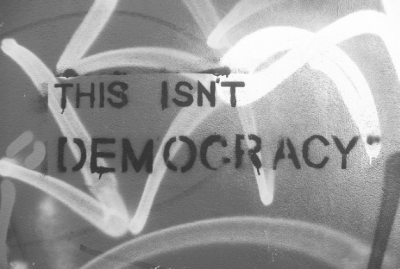Thoughts on the False Dichotomy Between “Western Liberalism” and “Fascism”

All Global Research articles can be read in 51 languages by activating the Translate Website button below the author’s name.
To receive Global Research’s Daily Newsletter (selected articles), click here.
Click the share button above to email/forward this article to your friends and colleagues. Follow us on Instagram and Twitter and subscribe to our Telegram Channel. Feel free to repost and share widely Global Research articles.
***
Twentieth century fascism/social cleansing advanced with overt, brutal assertions of power by way of invasion of foreign territory…
Twenty-first century fascism/social cleansing advances in sly, covert clauses in legislation that cuts vulnerable people off from resources needed to survive, as well as through military adventurism in the Middle East.
If it succeeded at anything, 20th century fascism succeeded most as a pioneer of commercial/corporate advertising.
Propagandist techniques piloted and mastered by the nazis were studied, absorbed and replicated by allied forces, who then deployed them for their own warped agendas. In so doing the contemporary “liberal democracies” can be meaningfully described as fascist. I will continue to explain why.
The historical possibility of global fascist hegemony was explored by fantasy author Phillip K Dick in “The Man in The High Castle.”
Whilst his narrative differs from historical fact in that global hegemony was headed by axis powers in his narrative, rather than allies, it converges with historical fact to the extent that we certainly do live under a system of totalitarian global hegemony, completely lacking in meaningful freedom and liberty for citizens.
The moral case against the Nazis was that they aspired to a wrongful world domination, in which they would enforce oppressive racial hierarchies.
Such policies would — and did — dispossess and brutalise the diasporas created by modern imperialism, culminating in the tragedy of the holocaust.
The allied powers, although only in rhetoric and not in deed, invoked this moral responsibility to justify war against Germany.
In all truth the utter terpitude of the Nazis derived mainly from material factors, such as a domestic political economy incorporating corporations with the state, although the influence of ideational factors also influenced the political dynamics of Hitler’s rule, such as religious and occultist belief systems adhered to by the Nazis.
After the conquest of Hitler the mood in the west was joyous and buoyant.
Seemingly, good had won. But beneath the facade of western moral victory was the apparent internal rot of imperialist systems.
For one, the victory was partly predicated on the use of nuclear weapons on Japan, an absolute aberration from humanist values that ought forever stain the reputation of the west.
Also, and less publicly recognised than the horror of nukes, is the fact leading Nazi scientists were absorbed by NASA and the CIA. Let that sink in. This occurred under the auspices of intelligence programs.
Under the policy parameters of the “War on Terror,” the US – and NATO forces subsumed under it – have established something resembling a caliphate in Middle Eastern territories, having invoked a moral panic in the wake of 9/11, the subtext for military adventurism in the region.
A point of interest in these adventures is that they were the first historical occurrence of a war fought with more private contractors on the ground than traditional soldiers.
The result was that public utilities and domestic infrastructure of Middle Eastern countries were dismantled and absorbed into the portfolios of transnational corporations, who operate with impunity, cloaked behind the terms and conditions of opaque corporate governance, which destroyed the soul and substance of Arab civic society.
Though western powers cite an absence of liberalism as a reason to invade, the post-invasion reality is an even starker absence of liberalism, rendering such justification invalid. In all truth the major motive for occupation is likely the boon of oil and drug resources.
Regional guerillas, such as ISIS, have, despite the current opposition to them in the west, been actively employed by western powers in the past, because they were perceived to be useful to western agendas and susceptible to manipulation.
Their role in destabilising the Middle East was the explicit intention of the West.
With the disclaimer that this is pure conjecture I personally suspect the reason Assange was indifferent to being perceived as a bedfellow of Trump was because Clinton armed ISIS in Libya.
Crimes against humanity are the hallmark of modern despotism and whilst the Holocaust was a uniquely evil event, the tactics and protocols which enabled it are evident in western foreign policy.
It is industrialised slaughter on a global scale made possible by the invention and trade of weapons, heinous use of force and humanity’s technological capabilities against innocent civilians.
These are committed at the behest of hypocritical governments, vainglorious and callous elites who take the insult even further by shamelessly appropriating the rhetoric of humanitarianism to cloak themselves in glory.
US crimes against humanity are not a small handful or a rare mistake, they are endemic, within both domestic society — in the form of brutal institutional racism — as well as within foreign policy, externalising and protecting white supremacist ideology — “American exceptionalism” — on the world at large. In comprehending and understanding the histories and legacies of our societies, the virtue of intellectual honesty calls upon us to condemn our rulers just as we condemn Hitler, for, as I hope to have demonstrated, it is objectively true that these systems of power are relative and comparatively similar.
*
Note to readers: Please click the share button above. Follow us on Instagram and Twitter and subscribe to our Telegram Channel. Feel free to repost and share widely Global Research articles.
Megan Sherman is a regular contributor to Global Research.


